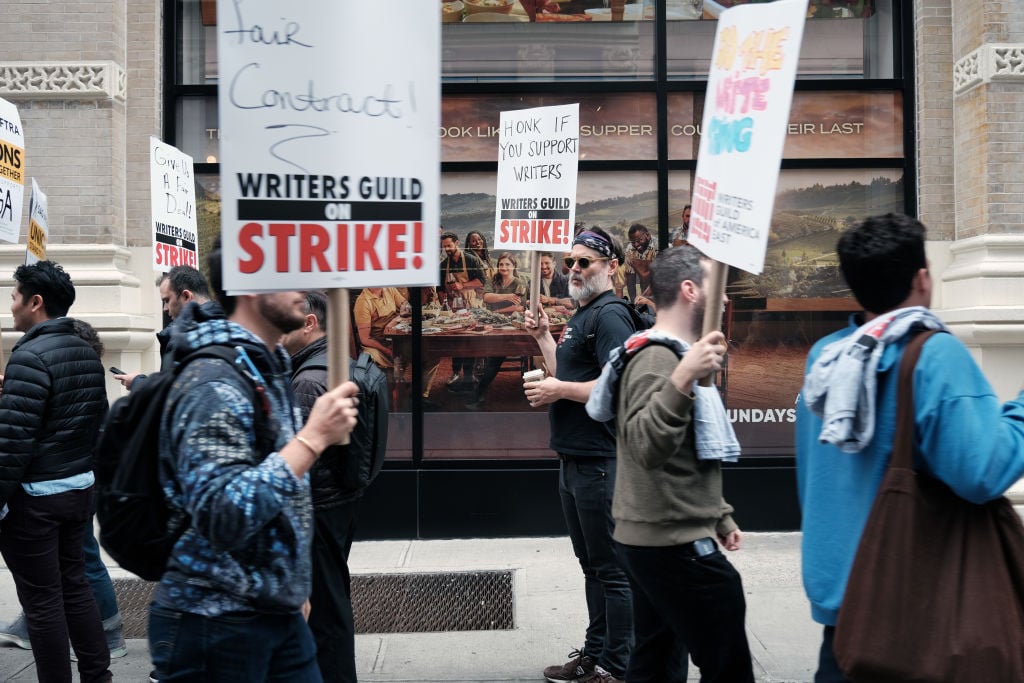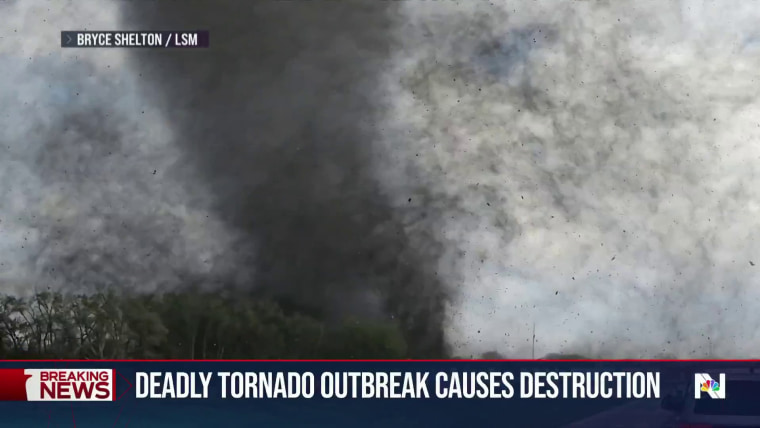Actors And Writers Strike: Hollywood Faces Unprecedented Production Halt

Table of Contents
The Writers' Strike: Key Demands and Impact
The Writers Guild of America (WGA) strike, which began in May 2023, highlights crucial issues facing screenwriters in the modern entertainment landscape. Their demands center on fair compensation, the threat of AI, and the overall impact of the streaming revolution on their livelihoods.
Fair Compensation and Residuals
The core issue for writers is the dramatic shift in compensation models brought about by streaming services. Traditional television provided writers with residuals – payments each time their work aired – ensuring a steady income stream beyond the initial sale. Streaming services, however, often offer significantly lower residuals, or none at all, severely impacting writers' income.
- Streaming residuals are often a fraction of what they were for traditional television. A writer might earn significantly less from a successful streaming series than they would have from a comparable network show.
- The unpredictable nature of streaming viewership makes it difficult for writers to project their earnings. Unlike traditional television, where viewership is consistently tracked, streaming numbers can be opaque, making it hard for writers to budget effectively.
- The WGA is pushing for fairer compensation models that reflect the value of their work in the streaming age. This includes advocating for a more transparent system of residuals and a greater share of profits from successful shows.
The Rise of AI and its Threat to Writers
The increasing use of AI writing tools poses a significant threat to writers' livelihoods. The fear is not just about AI replacing human writers entirely, but also about the potential for AI to be used to lower production costs by reducing the need for human writers.
- AI writing tools are becoming increasingly sophisticated. These tools can generate scripts, outlines, and even entire episodes, raising concerns about job displacement.
- Writers worry about their creative work being used to train AI models without their consent or compensation. This raises significant ethical and legal concerns about intellectual property rights.
- The WGA is demanding regulations and safeguards to protect writers from the misuse of AI. They are pushing for clear guidelines on the use of AI in writing and to ensure that human writers receive proper credit and compensation for their work.
Impact on Television and Film Production
The writers' strike has already had a significant impact on television and film production. Numerous shows have been delayed, and some may be canceled altogether. The ripple effect extends beyond the writers themselves, affecting actors, directors, crew members, and the overall economy.
- Production on many network and streaming shows has been completely halted. This leads to significant delays in release dates for new seasons and potentially new projects.
- The strike could lead to budget overruns and production challenges. When production restarts, there might be rushed schedules and added costs to compensate for the delays.
- The strike affects post-production processes, such as editing and visual effects, further delaying release dates.
The Actors' Strike: Joining Forces for Change
SAG-AFTRA, the actors' union, joined the writers' strike in July 2023, solidifying the unprecedented nature of the Hollywood shutdown. Their concerns mirror those of the writers, focusing on fair wages, working conditions, and the impact of AI.
Fair Wages and Working Conditions
Actors, particularly those in lower pay brackets, are facing increasingly difficult working conditions and often inadequate compensation, especially in the streaming landscape.
- Wage disparities between A-list actors and those in supporting roles are substantial and often unfair. Many actors struggle to make a living wage, even with significant screen time.
- Long working hours and demanding schedules are common in the entertainment industry. Actors often work excessive hours for minimal pay, particularly in streaming projects with shorter production timelines.
- Streaming deals often offer actors smaller upfront payments and fewer residuals compared to traditional television. This makes it harder for actors to plan their finances and can lead to financial instability.
The Use of AI in Acting and its Implications
The use of AI in acting, particularly AI deepfakes, raises significant concerns among actors. These technologies raise questions about job security and the potential for their likenesses to be used without consent.
- AI deepfakes can be used to replace actors in films and television shows. This threatens to erode actors' jobs and undervalue their skills.
- Actors are concerned about the potential for AI to be used to devalue their performances. The use of AI could lead to lower pay and less creative control for actors.
- SAG-AFTRA is demanding safeguards against the misuse of AI in the acting industry. They seek clear guidelines and protections to prevent the exploitation of actors through AI technologies.
Impact on Film and Television Productions
The combined strike by actors and writers has brought the entire Hollywood production pipeline to a standstill. The consequences are far-reaching and affect every aspect of the industry.
- Major film and television productions are completely shut down. This leads to massive delays and potentially significant financial losses for studios and streaming services.
- Premiere dates for anticipated films and shows are postponed indefinitely. This impacts marketing campaigns, release schedules, and the overall business of entertainment.
- The economic repercussions extend to all sectors of the industry, including caterers, location scouts, and countless other professionals who rely on film and television productions for their livelihoods.
The Potential Long-Term Effects of the Actors and Writers Strike
The outcome of the Actors and Writers Strike will have profound and lasting effects on the entertainment industry. The negotiations and their results will shape the future of labor relations, streaming services, and content creation.
Negotiation Outcomes and their Implications
The success or failure of the strike will significantly impact the future of labor relations in Hollywood.
- A successful strike could lead to significant improvements in wages, residuals, and working conditions for writers and actors. This could set a precedent for future negotiations and improve the overall working environment.
- A failure to reach a satisfactory agreement could lead to further strikes and prolonged labor disputes. This would cause even greater instability within the industry and could damage the relationship between unions and production companies.
- The strike could lead to significant changes in the way streaming services operate and create content. The industry may need to adjust its business models to accommodate the demands of writers and actors.
The Future of Streaming and Content Creation
The strike could force a re-evaluation of the streaming model and its impact on creative professionals.
- Streaming services may need to re-evaluate their compensation models to better reflect the value of writers' and actors' contributions. This could lead to more equitable distribution of profits and better working conditions.
- The quantity and quality of content could be affected in the long term. Production delays could lead to a shortage of new content, while changes to working conditions could impact the overall quality of what is produced.
- The strike could lead to a greater focus on the importance of fair labor practices and the need for collaboration between unions and studios. This could lead to a more sustainable and equitable future for the entertainment industry.
Conclusion
The Actors and Writers Strike represents a critical turning point for the entertainment industry. The key demands – fair wages, reasonable residuals in the streaming era, and protections against the misuse of AI – highlight systemic issues that threaten the long-term health and sustainability of film and television production. The unprecedented scale of this dual strike underscores the severity of these issues and their impact on the creative professionals who drive the industry. It's imperative that the concerns of writers and actors are addressed to ensure a future where creativity can thrive. Stay informed about the progress of the Actors and Writers Strike by following reputable news sources and participating in relevant discussions. The future of Hollywood depends on it.

Featured Posts
-
 Alfonso Arus En Arusero A Favor O En Contra De Melody Para Eurovision 2025
May 19, 2025
Alfonso Arus En Arusero A Favor O En Contra De Melody Para Eurovision 2025
May 19, 2025 -
 Renowned Singers Last Performance A Heartfelt Goodbye Due To Memory Problems
May 19, 2025
Renowned Singers Last Performance A Heartfelt Goodbye Due To Memory Problems
May 19, 2025 -
 25 Killed In Devastating Tornado Outbreak Across Central Us
May 19, 2025
25 Killed In Devastating Tornado Outbreak Across Central Us
May 19, 2025 -
 Eurowizja 2024 Analiza Najwiekszych Porazek Polskich Preselekcji
May 19, 2025
Eurowizja 2024 Analiza Najwiekszych Porazek Polskich Preselekcji
May 19, 2025 -
 Wnba And Social Activism A Critical Analysis Of Recent Events
May 19, 2025
Wnba And Social Activism A Critical Analysis Of Recent Events
May 19, 2025
